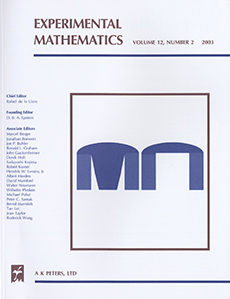Abstract
The proof by Euclid that there exist infinitely many prime numbers is well known. The proof involves generating prime numbers that do not belong to a given finite set of primes, and one may ask whether all prime numbers can be obtained by this method. Daniel Shanks gave a heuristic argument that suggests that the answer is affirmative. Despite recent advances in computational number theory, numerical examples do not seem to make this conjecture convincing. We reformulate the problem in polynomial rings over finite fields and prove that in some explicitly characterized cases, Shanks’s argument does not hold. On the other hand, we have performed numerical computations that suggest that except for the above cases, Shanks’s conjecture is true.
Citation
Nobushige Kurokawa. Takakazu Satoh. "Euclid Prime Sequences over Unique Factorization Domains." Experiment. Math. 17 (2) 145 - 152, 2008.
Information




